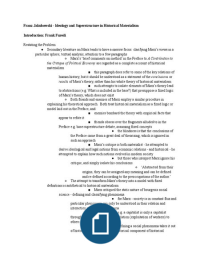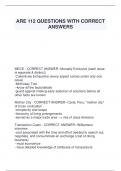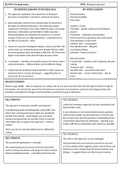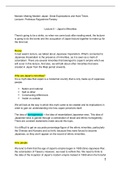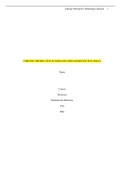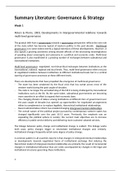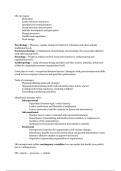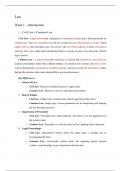Franz Jakubowski - Ideology and Superstructure in Historical Materialism
Introduction: Frank Furedi
Restating the Problem
● Secondary literature on Marx tends to have a narrow focus: clarifying Marx’s views in a
particular sphere; textual analysis; attention to a few paragraphs
○ Marx’s ‘brief comments on method’ in the Preface to A Contribution to
the Critique of Political Economy are regarded as a complete account of historical
materialism
■ this paragraph does refer to some of the key relations of
human history, but it should be understood as a statement of the conclusions or
results of Marx’s theory, rather than his whole theory of historical materialism
■ such attempts to isolate elements of Marx’s theory lead
to abstractions (e.g. What is included in the base?) that presuppose a fixed logic
of Marx’s theory, which does not exist
○ Both friends and enemies of Marx employ a similar procedure in
explaining his theoretical approach. Both treat historical materialism as a fixed logic or
model laid out in the Preface, and:
■ enemies bombard the theory with empirical facts that
appear to refute it
■ friends obsess over the fragments alluded to in the
Preface e.g. base-superstructure debate, assuming fixed concepts
● the blindness is that the conclusions of
the Preface came from a great deal of theorising, which is ignored in
such an approach
■ Marx’s critique is both materialist - he attempted to
derive ideological and legal notions from economic relations - and historical - he
attempted to explain how such notions evolved in modern society
● but those who interpret Marx ignore his
critique, and simply isolate his conclusions.
○ ‘Abstracted from their
origins, they can be assigned any meaning and can be defined
and re-defined according to the preoccupations of the author.’
○ The attempt to transform Marx’s theory into a model with fixed
definitions is antithetical to historical materialism
■ Marx critiqued the static nature of bourgeois social
science - defining and classifying phenomena
● for Marx - society is in constant flux and
particular phenomena can only be understood in their relation and
interaction with other phenomena
● e.g. a capitalist is only a capitalist
through establishing a particular relation (exploitation of workers) to
others
● defining a social phenomena takes it out
of history - thus neglecting the historical component of historical
Introduction: Frank Furedi
Restating the Problem
● Secondary literature on Marx tends to have a narrow focus: clarifying Marx’s views in a
particular sphere; textual analysis; attention to a few paragraphs
○ Marx’s ‘brief comments on method’ in the Preface to A Contribution to
the Critique of Political Economy are regarded as a complete account of historical
materialism
■ this paragraph does refer to some of the key relations of
human history, but it should be understood as a statement of the conclusions or
results of Marx’s theory, rather than his whole theory of historical materialism
■ such attempts to isolate elements of Marx’s theory lead
to abstractions (e.g. What is included in the base?) that presuppose a fixed logic
of Marx’s theory, which does not exist
○ Both friends and enemies of Marx employ a similar procedure in
explaining his theoretical approach. Both treat historical materialism as a fixed logic or
model laid out in the Preface, and:
■ enemies bombard the theory with empirical facts that
appear to refute it
■ friends obsess over the fragments alluded to in the
Preface e.g. base-superstructure debate, assuming fixed concepts
● the blindness is that the conclusions of
the Preface came from a great deal of theorising, which is ignored in
such an approach
■ Marx’s critique is both materialist - he attempted to
derive ideological and legal notions from economic relations - and historical - he
attempted to explain how such notions evolved in modern society
● but those who interpret Marx ignore his
critique, and simply isolate his conclusions.
○ ‘Abstracted from their
origins, they can be assigned any meaning and can be defined
and re-defined according to the preoccupations of the author.’
○ The attempt to transform Marx’s theory into a model with fixed
definitions is antithetical to historical materialism
■ Marx critiqued the static nature of bourgeois social
science - defining and classifying phenomena
● for Marx - society is in constant flux and
particular phenomena can only be understood in their relation and
interaction with other phenomena
● e.g. a capitalist is only a capitalist
through establishing a particular relation (exploitation of workers) to
others
● defining a social phenomena takes it out
of history - thus neglecting the historical component of historical

